Editor’s Note: Standing Rock movement founder LaDonna Allard left this life on April 10, 2021, after a battle with brain cancer at the age of 64. Mourners from around the world joined hearts on social media for days afterwards. Here we share a telephone interview with LaDonna from August of 2019.
When LaDonna Brave Bull Allard speaks these days, it’s a wake-up call to a lost nation. The founder of the first resistance camp at Standing Rock, which was Sacred Stone, she challenges us to step up to the work of transforming our culture of death. LaDonna carries the wisdom of her Lakota ancestors and the teachings she’s gleaned from today’s youth activists, and it’s a potent blend. I had the pleasure of meeting her at the recent Sovereign Sisters Gathering in the Black Hills, where she spoke to the group about the concept of sovereignty, the insanity of modern culture and the power of the Earth to heal.
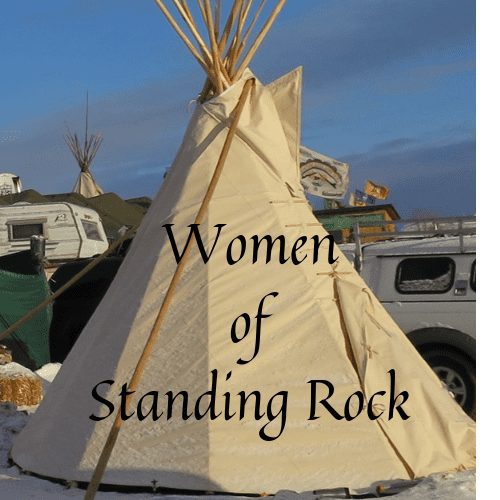
Now celebrating the arrival of her first great-grandchild, Tamakawastewin, or Good Earth Woman — her Lakota name — doesn’t show any signs of slowing down anytime soon. Now she’s involved in a project to establish a sustainable community on her land in Fort Yates, in the Standing Rock Sioux Reservation. I was curious to know more about the work LaDonna and her neighbors at Sacred Stone Village have been doing and was privileged to catch up with her recently for a phone interview. This interview has been edited for clarity and brevity.
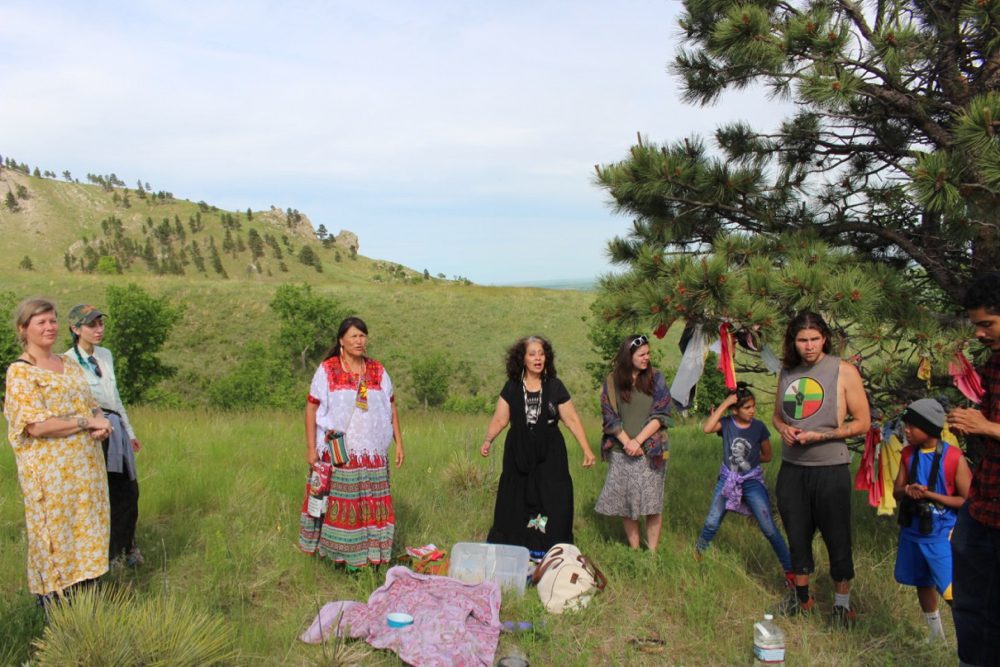
Tracy: LaDonna, it was wonderful to be able to connect with you in the Black Hills last month, and I really appreciate your taking the time to visit with me a little bit more. You spoke very eloquently about self-empowerment at the Sovereign Sisters gathering; you asked, “When as a people did we lose our self-empowerment?”
To start, I’d like to ask you what, for you, is the answer to that question? I know it has a lot to do with colonization, but I think it’s a complicated thing. So when, for you, did that loss of self-empowerment happen, and how?
LaDonna: I think when I came back home and moved back to Standing Rock and started to live off the land and realized that all of these issues that people live with today of waiting for someone to take care of them were not my issues. That self-empowerment came first from feeding yourself, planting gardens, taking care of your environment — and knowing who you are. Who were your ancestors; what did they do; where did they live, and how did they live. Empowerment is knowing self. I know who I am.
Read more from LaDonna at Women of Standing Rock: LaDonna Brave Bull Allard, Part I. Other stories in the Women of Standing Rock series include Many Standing Rocks: Three Years and Still Fighting, and Sovereign Sisters in Lakota Lands with Cheryl Angel. Stay tuned for more.
Speaking more collectively, in terms of indigenous people — or people in general. How do you feel that we lost our empowerment?
LaDonna: Look around you. Are there now programs to feed you? They are deciding whether you can see a doctor or not, whether you can have insurance or not. They are making laws about women’s bodies. They’re deciding who can come into this country and who cannot. They have immigration policies that they have no right to have because they’re not from this country. They’re destroying their land, their culture, their environment. Corporations rule the country. What kind of empowerment do you guys have? What empowerment does an American have? Who are they? Who are they really? What is their culture? And when did they give their empowerment over to a government?
Good questions, and I’m sure I don’t have the answers. What do you see as the path back to that self-empowerment? You mentioned food sovereignty as the first priority, so let’s start there. What does food sovereignty look like to you, and what is the best way to achieve that in a time of climate change?
LaDonna: Plant seeds. Plant everywhere. We’ve planted in the front yard — instead of grass we have tomatoes, peppers, corn, squash. We have chickens, we plant trees — we plant fruit trees everywhere. If you live in an apartment, plant a tomato plant. The first act of sovereignty is feeding yourself. The loss of sovereignty is waiting for somebody else to feed you.
Can you talk a little bit about what’s happened there at Sacred Stone Camp since most of the people left?
LaDonna: So a lot of people never left; they’re still here, and they’re now engrained in the community. Some teach at the schools, and at the colleges. They help with environment, the city cleanups. At Sacred Stone we have some yurts set up, promoting green housing; we have a small contingent of solar, and we hope that we can raise funds to expand that, so that we’re all on solar. Wind power; how do you care for yourself? If all the electricity and everything went out, how do you care for yourself?
On the reservation as you know, Standing Rock Tribe, we are below poverty levels; many of the people live by trade and barter. A lot of people live in homes without electricity and running water. We burn wood to heat our homes. And so a lot of the stuff that we talk about is the way people live here anyway. What I find in the large cities is people who don’t know how to live. If you took away the electricity and the oil, what would they do? We already know how to live without those things.
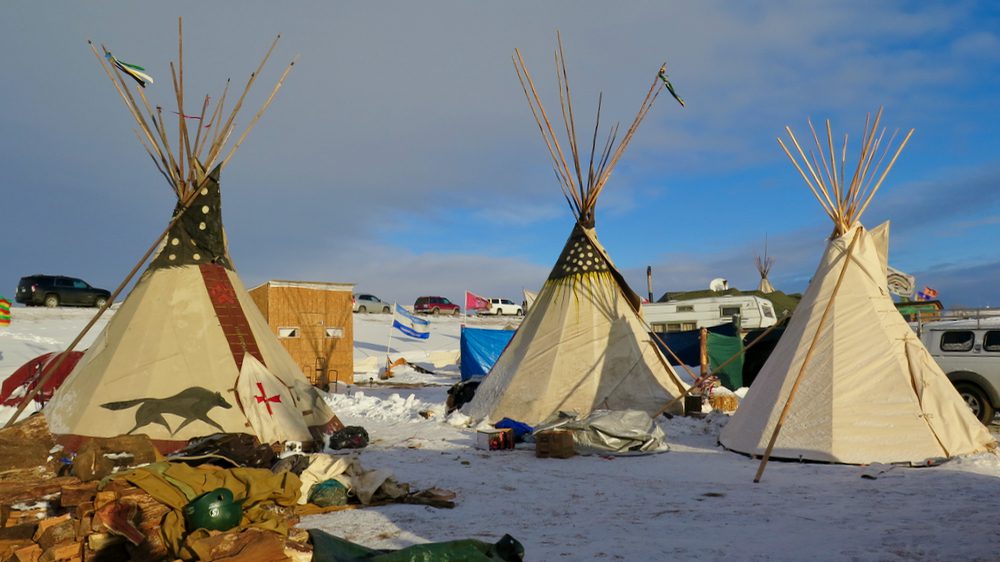
So in many ways your community is already much more prepared that the rest of us for the sorts of crises we’re starting to see and we’re probably going to see a whole lot more of.
LaDonna: We’ve been telling you guys since 1983 what was coming. I think that there’s too much soft earwax in the ears — they don’t listen. We know what’s coming; we understand climate change. We can’t just wake up in the morning and say it doesn’t exist, because we live in the environment, we live in the world around us. Our animals — we watch the migrations, we see all of these things, and so we know it’s here. The storms have gotten worse. The United States has even stopped reporting the huge crises that are happening with the climate, the disasters that are happening every day.
You said the other day you feel like we’re on the fast track in terms of climate change. Can you explain?
LaDonna: I don’t know how to do that — it’s right here, it’s right now. I ask you: What kind of storms were happening last night? What kinds of storms did we have yesterday? How many earthquakes are we having across the world right now? What about the fires in the Arctic, where there have never been fires before? The massive ice melts. The rising waters. We see them.
How about the flooding happening there in the Dakotas – that’s not normal, either, is it?
LaDonna: There is no normal anymore.
True. It’s very worrisome.
LaDonna: We don’t worry about it. We prepare, we plan, and we get ready. It’s the way our culture dictates to us. Worry is a useless emotion. You prepare. And so we’ve been stocking up wood; our chickens are nice and fat; we’ve planted all our garden vegetables, we’ll harvest, get them prepared, we’ll dry some and we’ll can some. We start preparing for winter in July — because we know, this last winter was pretty bad and we know the winter that’s coming up is going to be really bad, so we prepare.
We’re making plant medicines, we’re drying them, we’re making teas, all of the normal things that we do.
Can you tell me more about Sacred Stone Village? What are some of the projects you have begun there in order to take back self-empowerment and sovereignty?
LaDonna: We do community to community; we have people go and pick up trash, they cut down trees that need to be cut down, they clean lots; they interact with the community. Jarod (Galvin) for example; he came for the camps, and he stayed; he’s the mayor now of Fort Yates. The people are integrating into the community. Many of the people who came to the camps were very educated people so they brought their education here.
Today is the day we’re going down to the presentation when they’re going to open the solar farm — the whole community of Cannonball is going to be solar. We’re teaching the schoolkids to produce their own media, to control the narrative.
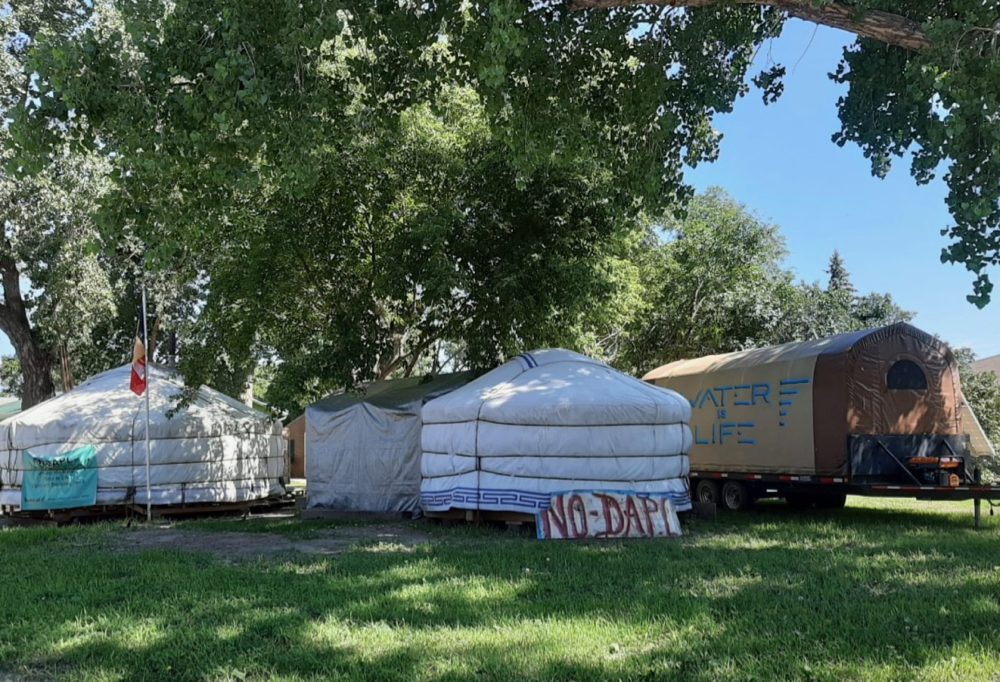
We have people from all over the world who come here; they stay two days sometimes, some never leave. Laura from Spain came for two days and has been here a month and a half. Benjamin and his wife just came from France; every other day, somebody shows up. They come, they help, they work, they stay a few days or a few weeks and then they go — but it’s a constant influx of people who come here. And when they come we teach them a little about history, culture, language.
It’s been three years now since you started this project — What has worked, what hasn’t worked so well?
LaDonna: It’s been a nonstop process; we do a lot of media. We do a lot of support of movements across the whole world right now. One of the things I tell people is that Standing Rock was just a seed, and that seed has spread all over the world.
I have just come back from Mauna Kea, in Hawaii, and I’ll be leaving for Portugal next week for Defend the Sacred, where people will be coming from all over the world and we’ll be talking about these issues. From Standing Rock until now, we’re talking to each other, we’re all supporting each other — trying to teach the world how to live in this world, using green energy — trying to remind people that we have this connection, the songs, the language, the ceremony still exists among the indigenous communities, and it’s important for keeping the world in balance.
I try to stay away from the negative but in the government there’s propaganda — newspapers, media, we try to correct the narrative. That’s our job, we tell the truth.
What other kinds of challenges have you had to face there?
LaDonna: We still have the issues with the police, with the Dakota Access Pipeline and Energy Transfer Partners. We still have issues with the state government — but remember, we’re native, so they don’t have any rule or say over us. And with this action last week, the tribe has multiple lawsuits going on — nothing’s done here as far as Dakota Access. We’re still working and moving forward with our first position, which is to end the pipeline, and nothing changed. We’re still moving forward. Nobody has stopped.
That in itself is a pretty consuming process I’m sure — the pipeline is operating now but you’re still fighting it?
LaDonna: Yes — we are now fighting in the courts of law, and the courts take a while.
Can you tell me a little bit about the successes — what’s really made you proud there in these three years of working with your newfound community as well as the longtime folks?
LaDonna: There’s so much going on — Sacred Stone Village will be the first volunteer fire department for the Standing Rock Reservation. Last year we did 140 miles of river cleanup. We planted 60 trees this year, planting every year. Helping elders do their gardens, mowing, cleaning up yards, taking down dead trees and giving the wood to people who use wood for fire. And of course working with the youth.
What makes me proud is the young boy who when we went up to Sacred Stone came up and said, “I want to sing.” He said, “Before camp I didn’t know any of our songs or anything about our people — and now I sing everywhere. That’s what makes me proud, that it brought back the culture and the language to the young people. And it gave them purpose. It gave them a pride of who they are.
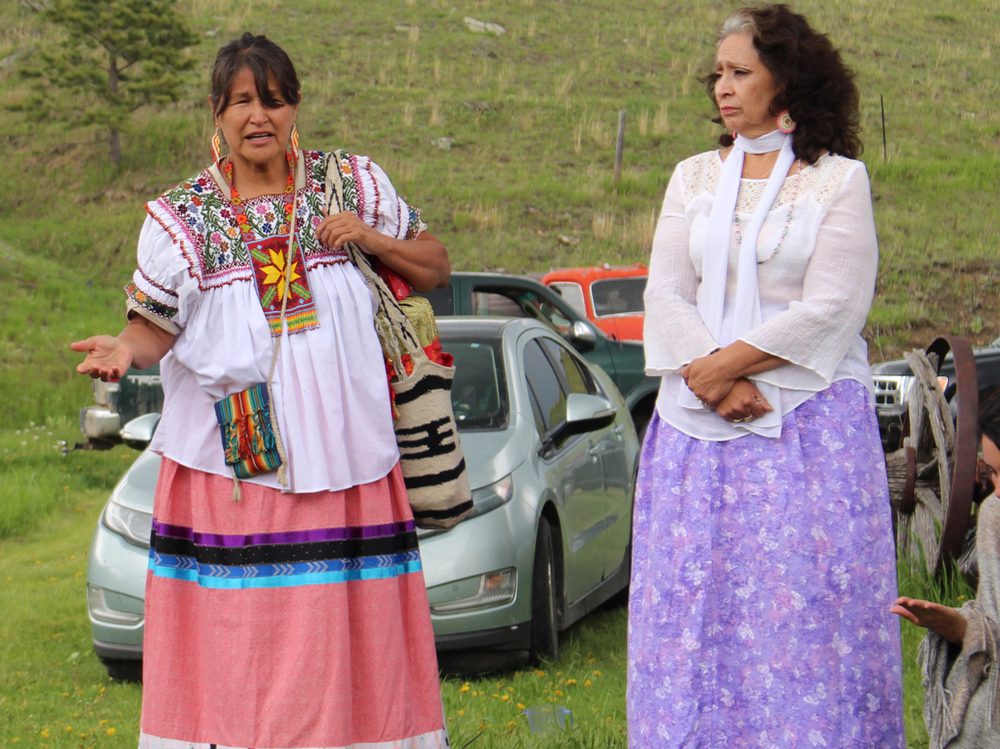
Can you talk to me a bit about the lessons you’ve learned in building up that community?
LaDonna: I learned a lot about white privilege, which I really didn’t understand until then; the vast propaganda that is being put out on media these days, and the fact that the government is not our friend — and how the United States became not a government of the people but a corporation, and how the people of the United States lost their power. Those were all very shocking for me.
And that our police in the United States became police of the corporations and entities rather than the protectors of the people. My father was a police officer and I grew up with the idea that police officers were civil servants — and now I see them defending corporations over their own people. And for the first time America is set up to attack their own American people rather than to protect them.
What did I learn? To not trust the government. At least the current one.
I also learned that in this day and age, we have to define who we are. And so as we continue to tell, our people are from the tip of Argentina to the tip of Canada. There are no borders, and we will continue to say that. We are one people, we stand together.
What did I learn? That strength in supporting each other is the power — empowering self. That’s why I tell people: Empower yourself. And I also learned that the Earth has this power inside of it and if they lift it up and gather into her we can empower ourselves. The Earth is here to heal us. And as indigenous people of this continent we have been damaged and terrorized. And now we’re at the point where we can go back to the Earth and grab that healing, heal indigenous communities. I truly believe that indigenous communities can save the world. We can turn this around.
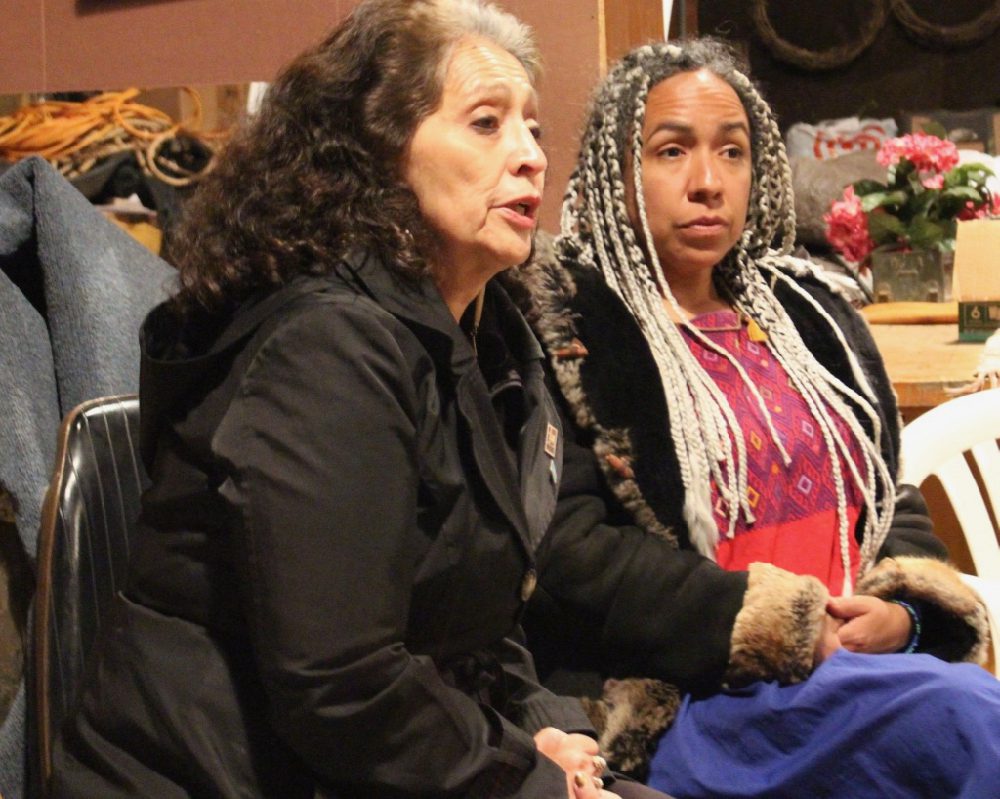
I believe that too — very much. I’d like to ask you, too, this being the Esperanza Project — and Esperanza, as you may know, means Hope — what is it that gives you hope out there?
LaDonna: You know I’ve got a great granddaughter? She’s the cutest baby I’ve ever seen! Hope is our future generations. Hope is our grandchildren, and now our great grandchildren. I dream that they can see what I see. I dream that they can experience what I’ve experienced. And so that’s what hope is — the next generation.
Congratulations on your granddaughter. I’ve seen pictures and she’s truly beautiful.
LaDonna: She’s fat, isn’t she? (Laughter)
One more question: How can people help?
LaDonna: Stand up now. Scream loud, and make change.
We invite people to come and work on the ground. We always believe help comes from two hands, so people come and work in the community. We’ve never asked anyone for money.
We have Sacred Stone Camp and Sacred Stone Village on Facebook and we give updates so you can follow us there.
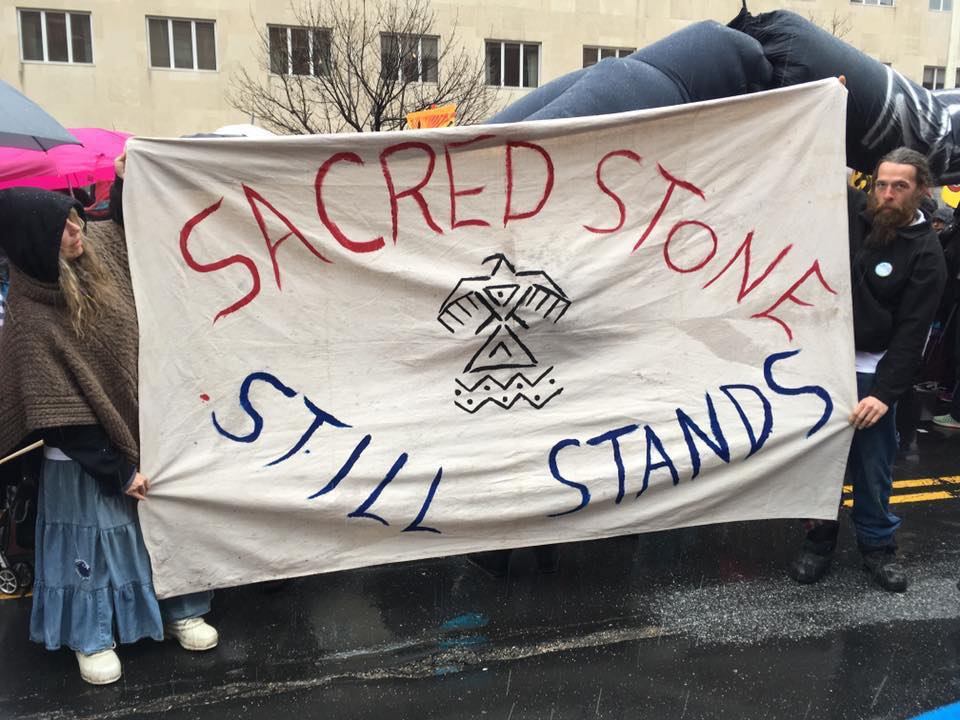
- ‘Planting Is a Right’: Guadalajara’s Urban Ag Rebels Rally Against Proposed Regulations — Again - January 21, 2026
- The women who kept a Mexican pueblo above water — and stopped a megadam - January 15, 2026
- Reading the Earth: How Mexican scientists are using nature to find the disappeared - January 7, 2026
LaDonna Brave Bull Allard Sacred Stone Village Standing Rock